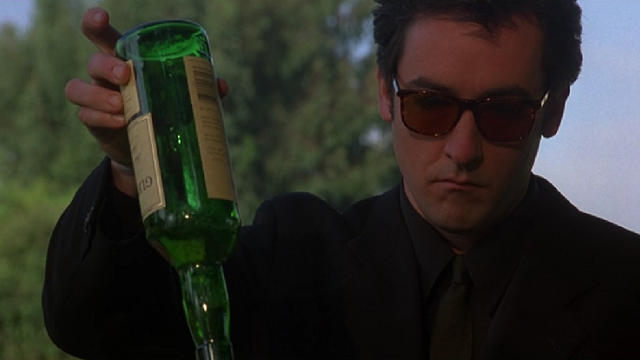If you love something, set it free. If it comes back to you, well, it’s broken.
You can’t go home again.
As soon as you leave, things change. You change. Your home changes. Everything changes apart from each other. By the time you come back, you have a certain set of expectations from the nostalgic memories we all harbor about our home. Nothing ever lives up to those memories.
Martin Q. Blank (John Cusack) hasn’t been home for 10 years. He left his hometown, Grosse Pointe, MI, and never looked back. On prom night, Martin stood up his girlfriend Debi (Minnie Driver) to run off and join the army. Since leaving, he turned into a disturbed loner who assassinates people for money. In the meantime, Grosse Pointe has changed. His father is dead, his mother is crazy, his childhood home is now a convenience mart and gas station. Ghosts from his past haunt every nook and cranny and his present is chasing him down in the form of Grocer (Dan Ackroyd), a fellow assassin trying to form an assassin union. You can’t go home again.
Using Grosse Pointe as a setting contains a political and metaphoric contrast. Even though Grosse Pointe is about 8 miles east of Detroit, back in 2000 it was 97% white. It was one of the first commuter suburbs of Metro Detroit, and full of upper-middle-class money. Back in 2000, the median household income was $89k. Grosse Pointe’s downtown is made of a bedroom community of storefronts that maintain an atmosphere of 1950s Mayberry. It’s precious, quaint, and a jarring disconnect from the brutal reality of poverty and violence that was happening 8 miles away in Detroit. Grosse Pointe is a veritable wealth bubble that provides a distance from the big city life Martin has been living in sunny California.
Martin’s 10 year reunion also provided an excuse to bring back all of the music from 1987 for one final hurrah. The music of the 80s was fading away, but hadn’t quite had a chance to die yet. If this movie were to come out today, it would include Justin Timberlake’s Sexyback and Rihanna’s Umbrella, songs just fading out of the consciousness but still regularly played if you’re listening to the right radio stations. Though Armitage makes the 10 year reunion as a major cross roads, these people are only 27/28. Not even 30, not even at the midway point. They’ve just climbed out of the irresponsibility of their youth and formed a life for themselves. Maybe they’re still chasing women to find an appropriate wife. Maybe they’re married with a newborn child. Maybe they’re already gearing up for their first career change. Who knows, but they still have more than half their life ahead of them.
That’s where we find Martin Blank. 28: no wife, no girlfriend, neurotic and paranoid, and gearing up for his second career and third life change. He hadn’t returned home for his father’s funeral. His life has been a slacker dream of cruising across the country killing people for money. It’s when the aging Grocer pulls together a union that Martin realizes his slacker job has turned into a career and he has little to show for it. His existence is just f…a…d…i…n…g out of the Grosse Pointe consciousness, but close enough for people to have a nostalgia factor when meeting him. The return home presents a cross roads where his past life and present career have a battle for his future and soul. To move ahead, you have to finally pull the trigger, kill one of your realities and make your way into the future.
I’m adding a lot of weight to Grosse Pointe Blank, which is anything but. Director George Armitage (Private Duty Nurses, Miami Blues) crafted a film that seamlessly straddles between absurdist black comedy and wistful nostalgia. He has no problem juxtaposing the image of Martin pouring out a bottle of whiskey on his father’s grave next to a convenience store shootout. By deftly alternating between expected reunion tropes and the darkly hilarious of hit men, the comedy, the violence, the nostalgia, and the maudlin emotion all cycle and feed into each other in a nesting spiral. Grosse Pointe Blank is a crafted and sculpted piece of fine storytelling that presents itself as a lark, capturing a time and age where people were assessing the various directions that life was about to take.

